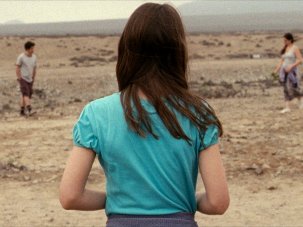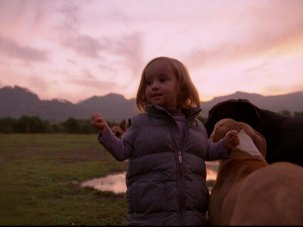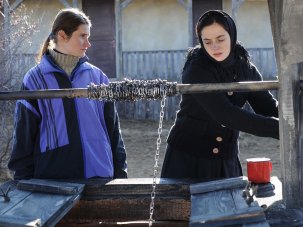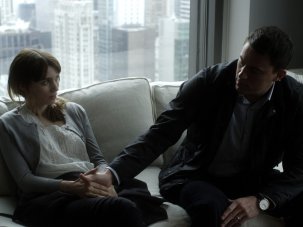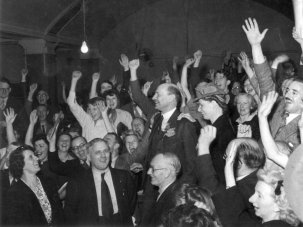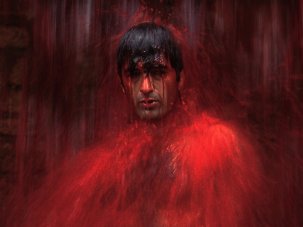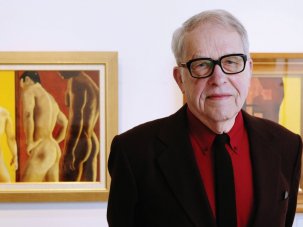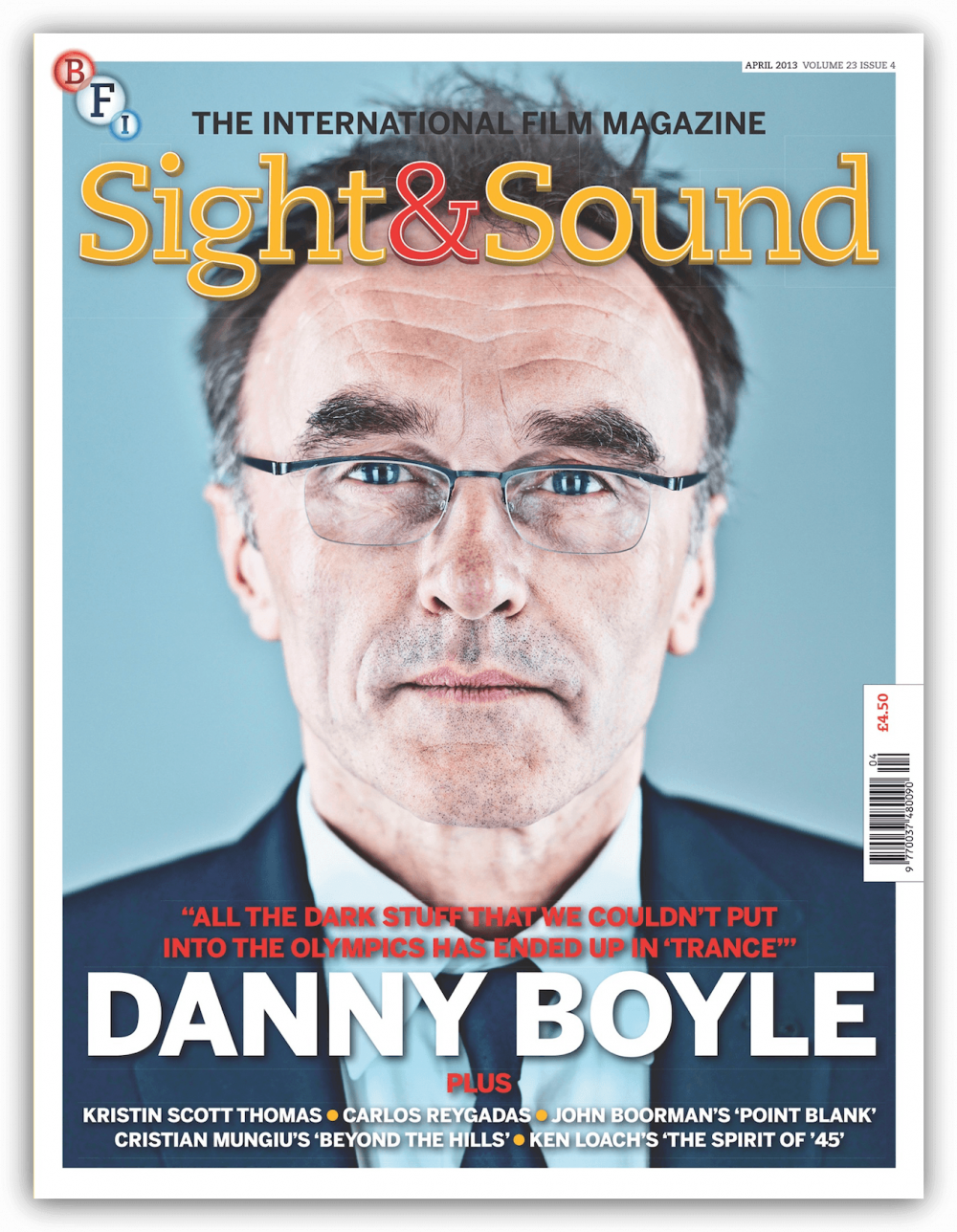
No one has done a better job of presenting Britain in an international context than this month’s cover star Danny Boyle, as he did magnificently with last year’s Olympics opening ceremony. The director fills our special S&S Interview slot just in time for the release of his new London-set film Trance, a complex thriller about an amnesiac art auctioneer (James McAvoy) who enlists Rosario Dawson’s hypnotherapist to help him remember where he stashed a Goya he helped Vincent Cassel’s gangster to steal.
|
Posted to subscribers and available digitally On UK newsstands |
Made under the influence of Nic Roeg, Trance is Boyle’s “murkiest” film yet, according to our interviewer Ryan Gilbey, and reunites him with Trainspotting screenwriter John Hodge. As Boyle recalls, he shot the film before the Olympics and edited it afterwards, so the theme of forgetting and remembering is apt indeed.
The career of Kristin Scott-Thomas – now starring in François Ozon’s Hitchcockian psychological thriller In the House (Dans la maison) – has seen her ricochet back and forth between the UK and France. Her English roles often confine her to a pre-WWII aristocratic stereotype, she’s complained – whereas, according to Ginette Vincendeau (in the latest of our series The Actors), it’s her very adaptable Englishness that has made her so right for a wide variety of lead roles in France, though they still benefit from her class-inflected persona.
Carlos Reygadas’s impressionistic new film Post Tenebras Lux is partly about an upper-middle-class family’s relationships with locals in the environs of the city of Tepoztlán (where Reygadas himself lives). At Cannes it perplexed and/or antagonised many. Yet according to Fernanda Solarzano – who interviews the spiky writer-director for us – Mexicans view it more acceptingly. The film and its maker are also the subject of our Forum debate, with regular contributor Jonathan Romney the champion and Argentine critic Quintin the skeptic.
Beyond the Hills, the new film from Cristian Mungiu (4 Months, 3 Weeks, and 2 Days), meets no such disagreement. This consummate closed-world drama concerns the fate of a nun in an Orthodox religious community and the friend who visits to persuade her to leave. As the letter’s besotted behaviour becomes more erratic, the nuns and their priest become convinced the visitor is possessed. Edward Lawrenson’s interview with Mungiu brings out the thinking behind this clash between abstract ideas and concrete events.
An impressive Berlinale line-up bettered Nick James’s expectations, with auteurs new and old coming to the fore, including Bruno Dumont with his Juliette Binoche-starring minimalist prayer-work Camiile Claudel 1915, Noah Baumbach with utterly charming Greta Gerwig comedy Frances Ha, and Wong Kar-wai with his kung-fu-shot-like-ice-skating historical extravaganza The Grandmaster, to name but three.
To make a movie that’s mostly confined to the interior of a car is the kind of low-budget challenge Chilean director Dominga Sotomayor clearly relishes. Thursday to Sunday follows a family – mother, father and two children – on the road from Santiago to the north of Chile, during which journey the marriage comes apart – as witnessed somewhat elliptically by the daughter, and described here by Mar Diestro-Dópido.
The inimitable David Thomson turns his attention this month to John Boorman’s magnificent thriller classic Point Blank, arguing that, in its splendid audacity and primal unleashing of Lee Marvin, it has lasted much better than the film it was up against in 1967, Bonnie and Clyde. Alongside that John Wrathall looks at other movie incarnations of Parker, the Richard Stark protagonist on whom Marvin’s Walker is based.
Our visual treat this month is a stunning display of Indian movie posters, with annotations by Divia Patel. These include a much wider variety than the garishly thrilling Bollywood posters we’re all used to.
Our comprehensive reviews pages include in-depth looks at Kleber Mendonça Filho’s Neighbouring Sounds, Matteo Garrone’s Reality, Steven Soderbergh’s Side Effects and Ken Loach’s The Spirit of ’45.
-
RUSHES: Cross-dressing at the London Lesbian and Gay Film Festival; Scott Graham’s debut Shell; Donald Richie, 1924-2013; Mark Cousins on global movie explorers; Hannah McGill on birthday cakes in the movies.
-
THE INDUSTRY: From pub to screen: Belfast music saga Good Vibrations; audiences say yes to No; flux in the UK distribution sector; Todd Yellin, Netflix’s VP for product innovation.
-
FESTIVALS: Nick James reports on an unusually varied and internationalist Berlinale.
-
Powerful performances in films such as I’ve Loved You So Long have made Kristin Scott Thomas a bona fide arthouse star, as popular in France as she is in the UK. By Ginette Vincendeau.
-
David Thomson revisits John Boorman’s violent and surreal Point Blank.
-
Romanian director Cristian Mungiu’s Beyond the Hills is a sombre, provocative and unsettling story of life in an Orthodox convent. He talks to Edward Lawrenson.
-
Set largely in the back of a car during a tense family roadtrip, Thursday till Sunday is a striking debut for Chilean director Dominga Sotomayor. She talks to Mar Diestro-Dópido.
-
At Cannes last year Mexican director Carlos Reygadas drew fire for the perceived incoherence of his – dazzling or baffling – new film Post Tenebras Lux. But he’s not one to take criticism lightly, finds Fernanda Solórzano.
-
As Indian cinema celebrates its 100th anniversary, a new exhibition reveals the country’s rich tradition in film posters. By Divia Patel.
-
THE S&S INTERVIEW: Following his glittering success with the Olympics opening ceremony, Danny Boyle talks to Ryan Gilbey about returning to darker matters in his new film Trance.
-
WIDE ANGLE: Portugal’s arthouse mecca; George Barber’s The Freestone Drone; the Belfort Film Festival; Kevin Brownlow on a 1925 Les Misérables; great directors’ uncredited works; movie characters’ special songs; Zoo in Budapest.
-
FORUM: Jonathan Romney versus Quintín on the merits of Mexican director Carlos Reygadas; Letters.
-
Neighbouring Sounds, Reality, Side Effects, The Spirit of ‘45 and 31 other new film releases.
-
HOME CINEMA: Mario Bava, That Cold Day in the Park, Etudes sur Paris, Ozu’s early gangster films, Tempo and 18 other releases.
-
BOOKS: Mae Murray: The Girl with the Bee-Stung Lips, Dan Graham: Rock My Religion, Japanese Cinema in the Digital Age and Abraham Polonsky: Interviews.
-
ENDINGS: The last minutes of Carlos Saura’s 1975 film capture the mood of Spain on the verge of freedom from the grip of Franco’s regime, says Mar Diestro-Dópido.
Features
COVER FEATURE: Danny Boyle – The Sight & Sound Interview
Following his glittering success with the Olympics opening ceremony and consequent elevation to the status of national treasure, Danny Boyle has returned to much darker matters. Inspired by the work of Nicolas Roeg, his new film Trance is set in London, but it’s not a celebration of the city – it’s a film that even the director describes as “cruel”. Interview by Ryan Gilbey.
Eurostar
Her subtle performances in films such as I’ve Loved You So Long and Leaving have made Kristin Scott Thomas as popular in France as she is in her native UK, where parts for older women seldom offer such scope. But how do perceptions of her vary on either side of the Channel? By Ginette Vincendeau.
A Very Bad Man
Eclipsed by Bonnie and Clyde on its release in 1967, John Boorman’s Point Blank endures as the most mysterious of US crime movies, a potent mix of violence and surrealism. By David Thomson.
PLUS From Lee Marvin to Jason Statham, a rogue’s gallery of actors have had a crack at playing crime literature’s most redoubtable armed robber, Parker. By John Wrathall.
Devotion sickness
An excellent successor to his 2007 Palme d’Or-winner 4 Months, 3 Weeks and 2 Days, Romanian director Cristian Mungiu’s Beyond the Hills is a sombre, provocative and unsettling story of life in an Orthodox convent. By Edward Lawrenson.
Are we nearly there yet?
Set largely in the back of a car during a tense family roadtrip, Thursday till Sunday is a striking debut for Dominga Sotomayor, and further evidence of the growing diversity of Chilean cinema. By Mar Diestro-Dópido.
The Devil in the detail
In one of the most notable controversies of last year’s Cannes Film Festival, the acclaimed Mexican director Carlos Reygadas (Silent Light) drew fire for the perceived incoherence of his – dazzling or baffling – new film Post Tenebras Lux. But he’s not one to take criticism lightly. By Fernanda Solórzano.
Indian ink
Works of great beauty and artistry in their own right, Indian film posters also give fascinating insights into the transformation of the nation’s film industry and culture in the century since the subcontinent’s very first feature film was released in 1913. By Divia Patel.
Regulars
Editorial: Quantitative clogging
Reader Offers
Rushes
Ben Walters previews the 27th BFI London Lesbian & Gay Film Festival.
First Sight: Isabel Stevens talks to Scott Graham about his directing debut Shell.
Obituary: Tony Rayns pays tribute to critic and Japan specialist Donald Richie.
Object Lesson: Hannah McGill on the significance of birthday cakes.
Dispatches: Mark Cousins calls for a truly global perspective to film criticism.
The Industry
Development Tale: Charles Gant charts the long gestation of Belfast indie-music saga Good Vibrations.
The Numbers: Charles Gant on how British audiences said yes to No.
Overview: Geoffrey Macnab on the turbulent state of UK distribution.
Profile: Nick Roddick talks to Netflix’s head of product innovation, Todd Yellin.
Festivals
Nick James is heartened by the quality of this year’s Berlin selection.
Wide Angle
Jaime Pena on how thge town of Guimarães in Portugal became a mecca for arthouse directors.
Sukhdev Sandhu on George Barber’s video installation The Freestone Drone.
Agnieszka Gratza peels back the covers on the Belfort Film Festival.
Soundings: Frances Morgan tunes in to the songs that mean something special to characters in films.
Primal Screen: Kevin Brownlow looks back at a 1925 version of Les Misérables.
Bradlands: Brad Stevens hunts down the uncredited work of great directors in films credited to others.
Lost and Found: Dan Callahan marvels at the unique charms of Zoo in Budapest.
Forum
Jonathan Romney and Quintín debate the merits of Mexican director Carlos Reygadas.
Letters
Reviews
Films of the month
Neighbouring Sounds
Reality
Side Effects
The Spirit of ’45
Other releases reviewed in this issue
All Things to All Men
Arbitrage
Beautiful Creatures
Beyond the Hills
Dragon/Wu xia
A Good Day to Die Hard
Good Vibrations
Hansel & Gretel Witch Hunters
Home/Yurt
Identity Thief
In the House/Dans la maison
John Dies at the End
A Late Quartet
Maniac
Movie 43
Murder 3
The Odd Life of Timothy Green
One Mile Away
Papadopoulos & Sons
The Paperboy
Post Tenebras Lux
Reincarnated
Sammy’s Great Escape
Shell
Sleep Tight
Spike Island
Stolen
Thursday till Sunday
Trance
Warm Bodies
Welcome to the Punch
Home cinema features
James Blackford celebrates Italian horror maestro Mario Bava.
Dan Callahan is intrigued by Robert Altman’s largely forgotten 1969 That Cold Day in the Park.
Chris Darke relishes the new restoration of André Sauvage’s Etudes sur Paris.
Philip Kemp revisits Ozu’s early gangster films.
Plus reviews of
The Amazing Mr Blunden
Babette’s Feast
Cairo
The Dawn Patrol
Deathtrap
Dracula
The Monster Squad
On Approval
Onibaba
The Outside Man
La Poison
The Qatsi Trilogy
Run for Cover
We Can’t Go Home Again
White Zombie
Television
David Thompson looks back at the high and low-culture offerings of 1960s series Tempo.
Plus
Agatha Christie’s Poirot – Series 3
House of Lies – Season 1
Marriage Lines – Series 1 & 3
Books
Pamela Hutchinson enjoys a biography of silent star Mae Murray.
Paul Tickell welcomes a study of video essay Rock My Religion.
Jasper Sharp explores Japanese Cinema in the Digital Age.
Nick Pinkerton dips in to a book of interviews with Abraham Polonsky.
Endings
Mar Diestro-Dópido on Cría Cuervos.




